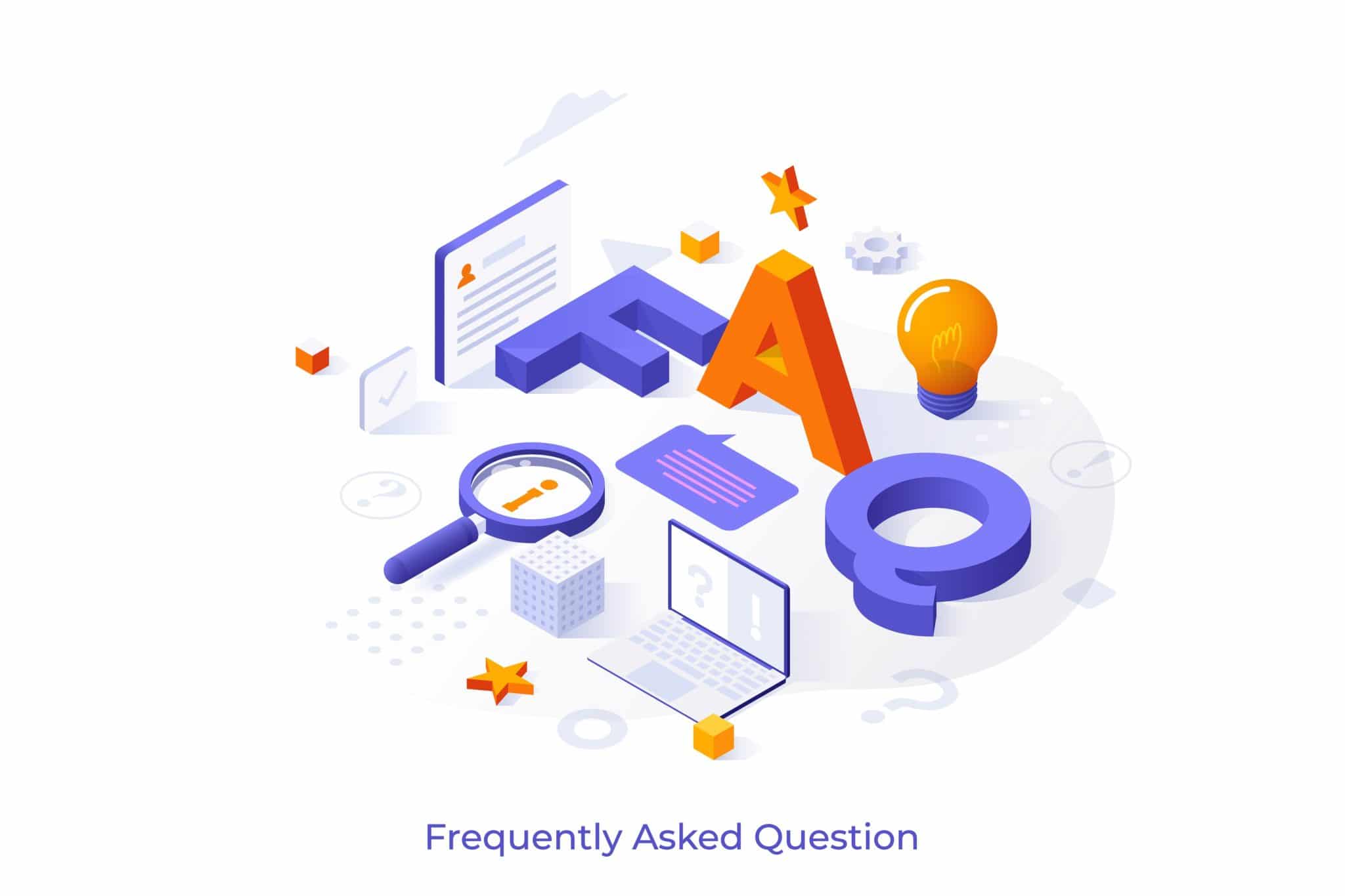One of the crucial questions you need to answer when building a website is deciding the pages to include. Some of the top websites on the internet focus on understanding their target audience, users’ search intent, and showcasing the brand, product, and services from various perspectives.
A website should be easy to navigate and visually appealing and help users understand what the website/business is about without the clutter.
In other words, the website should be so designed and structured that it is search-engine friendly (attract organic traffic) and conversion-optimized (transitioning visitors to customers).
An FAQ page can be of immense help in achieving these primary goals. However, you should not add the FAQ page to your website for the sake of adding one. It mustn’t be filled with generic questions and confusing answers. The commitment of the company must be visible in the effort put into developing an FAQ page.
This article will discuss why you need a FAQ page and the metrics that set a top-quality FAQ page apart from the competition.
Why Have an FAQ Page?

Even if other sections of your website discuss, inform, and educate visitors about your products, services, and company, having a comprehensive FAQ page helps. Let us discuss some of the benefits of having a FAQ page.
Addresses the Pain Point of Users – Informs, Educates, and Assists
You might have noticed people calling your business to ask a very basic question about your products or services at times. As a business owner, what might seem obvious to you may not be that obvious to the end-users.
If the questions they have in their mind are not easily answered on your website, they would keep searching and end up being a customer of your competition. Yes, some of these prospects would call, but most won’t.
An FAQ page would ensure that any doubts, confusion, questions, and hesitation of the users are addressed on the website itself. They don’t need to leave your website to search elsewhere, and neither have to take the pain of calling you up.
It enhances the user experience, which is one of the key selling points in today’s competitive market.
It would be wrong to think that being online or having a website is enough. Customer service is an ongoing process, and there are statistics to prove that, such as –
- 75 percent of online prospects expect assistance within 5 minutes.
- 66 percent of customers feel that the best thing a company can do to enhance customer experience is value their time.
- 54 percent of prospects/customers used email to reach the company’s customers in 2019-2020. And, these customers expected a response from the company within an hour.
- More than 51 percent of the customers today expect businesses to be available round the clock.
- Better customer service and experience can increase a company’s revenue by 4-8 percent.
These numbers prove why 60 percent of the consumers online prefer to find the answers to their queries themselves on an FAQ page or equivalent on a website.
It is nearly impossible for businesses to be available round the clock and throughout the year. So, it only makes sense to have answers to some of the most common queries by customers listed on the FAQ page. It assists, informs, and educates the customers about your products, services, and brand and helps convert leads into sales.
FAQ Page Helps With Boosting Your Website’s Ranking
Google has evolved over the years. Gone are the days when websites can fool the search engines with keyword stuffing or keyword-based queries. Google has reiterated time and again that user intent and user experience are its primary focus and the key parameters they weigh to rank websites.
Question-based keywords or long-tail keywords showcase users’ intent more aptly. Google even encourages users to ask questions. You might have noticed Google predicts the questions for you in its search bar based on what you’ve typed.
Voice search is on the rise, and it has made question-based queries more common than earlier. As per a survey, voice search is the second most popular choice after mobile browsers. Another 2019 survey found that nearly 48 percent of the consumers conduct general web searches through voice search.
Going by the current search trends, a user searching for a nearby salon in New Jersey isn’t going to type “New Jersey Salon” on their PC. Instead, users would prefer to ask:
- “Hey Siri, where’s the nearest salon?”
- “Alexa, suggest a salon near me.”
- “Hey Google, when does XYZ Salon close.”
Having said that, it does need to mention here that keywords do play an integral role in SEO. Niche-oriented and high-traffic keywords mustn’t be ignored when planning a content strategy.
However, keywords shouldn’t be the only focus. Having an FAQ page that answers the common questions asked by users can help achieve higher rankings in the search results.
The FAQs help target long-tail keywords and question keywords used by the users organically. It signals relevancy to Google and helps pull up your website in the search results.
Saves You Valuable Time – Reduces the Burden on Customer Support
When a customer has a query about your product or services or is looking for something specific, the first point of reference is the FAQ page. If they find a satisfying answer to their query through the FAQ page, they wouldn’t be calling customer support.
If it’s a mom-and-pop operation or a small business with limited manpower, such calls can eat up your precious time. For medium to large businesses, having a crisp FAQ page written would answer some of the common queries of customers, reducing their need to contact support. It saves considerable resources, time, and customer support bandwidth in the process.
Showcase Expertise – Establish Yourself As An Authority in The Industry
The FAQ page provides that perfect opportunity to showcase expertise. When a casual visitor to your website sees that you know what you’re doing and mean business, the chances of conversion increase.
It is because customers are more likely to invest in a well-established, professional, and legitimate business.
Helps With Website Navigation
The site’s navigation can be greatly enhanced using the FAQ page. The answers to the questions can be internally linked with relevant pages, products, and services to guide visitors in the right direction. It helps the customers find what they’re looking for easily and is a crucial conversion-optimization technique too.
Turnaround Any Negative Brand Perception
Use the FAQ section as an opportunity to point out the value offered by your products/services and what you bring to the table. The FAQ page can help turn around people’s negative perceptions about the company/brand. It can be used to showcase why your company charges a particular amount, why your products/services are better, and so on.
When you can justify the value your company offers and answer any negative questions that customers might have in mind, it helps change brand perception. FAQ sections are useful in educating customers, clearing confusion, informing them about products/services, and helping customers make the right decision.
Highlights Vital Information
Different visitors to your site would have reached through different channels. Some might have come through organic search, and some may have come from a website linking back to you, and so on. Many people may unwittingly land on your FAQ page.
It’s important to highlight key information like selling points, products, services, benefits, pricing, offers, contact information, and so on, wherever possible on the FAQ page. It ensures that the prospect is guided through the next stages of conversion with ease.
Website Analysis

Analyzing your website periodically is important to see what’s working and what isn’t. You can check through site analysis from where the visitors came, which page they landed on, how long they stayed on the FAQ page, where the visitors went from the FAQ page, and so on.
Such metrics can be useful in tweaking your website’s content, adding new sections/information, and making the FAQ page more relevant for the end-users.
Tips For Creating An Effective FAQ Page
With all the benefits mentioned above, there shouldn’t be any doubts about why you should have an FAQ page. However, it does raise a question about how to create a useful, crisp, and effective FAQ page. Let’s delve deeper –
Choose Right Questions
As mentioned earlier, don’t build an FAQ page just for the sake of having one. Instead, do some research, and make a list of some important and specific questions your audience is asking.
You can do a market analysis or do an internal or small survey with your existing customers.
Here are a few techniques to help you create a list of specific questions for your FAQ page –
- Go through the customer service emails or any voice call notes to check the customers’ queries. It would answer if there are queries that customers are frequently asking.
- During the discussion with customers or free consultation calls, note topics or areas where customers often seem confused. Answer those questions.
- If you’re active on social media platforms, ask your audience what questions they want answers to, what isn’t clear to them, and so on. It would help you land on some specific questions to include on the FAQ page.
- Checking your competitors’ sites is also a good idea to see the questions they have on their FAQ page.
Typically, answers to the questions on FAQ pages are short and crisp. However, if you want to go the extra mile, you can write a blog on the topic and link it to the relevant answer in the FAQ section. It showcases your commitment towards your customers and adds useful and optimized content to your website at the same time.
Clear & Concise Tone
When it comes to the content on the FAQ page, restrain from being too ‘salesy’ or adding irrelevant marketing jargon. It is not the place to digress because the whole point of the FAQ page is to give answers to customers’ specific questions.
Answer the questions clearly and concisely, and depending upon the age group of your audience, keep it simple and easy to understand. If you want, you can even write the answers in a first-person perspective to connect with your audience better.
Call-To-Action Should Be Visible
If a customer has visited the FAQ page, the chances are that the customer is stopping by to clarify certain doubts before making the purchase.
So, a call-to-action should be highlighted and placed strategically to guide the customer down the sales pipeline without hassles.
Keep Your FAQ Page Updated
The FAQ page shouldn’t be static or look dead. Keep it updated by answering the regular concerns and questions of your customers. A proactive FAQ page is a sign of the company’s commitment to its customers and the company’s progress as a whole.
As the business evolves, there would always be new information, new questions, new products, and other useful content ideas that you can incorporate with the FAQ page.
Keep the Layout Organized
If the FAQ page has a limited number of questions (10 or less), it can be organized in a row format. However, when the number of questions is over 15-20 or more, it can be clustered under different categories.
E.g, if it is an e-commerce store’s FAQ, different sections can be – returns, shipping, payment issues, brands, replacements, cancellation, etc. It helps the customers find the answers to their questions quickly without scrolling through tons of questions.
FAQ is an Extension of Blog and Not the Other Way Round

Now, just because you’ve put in so much effort to building a robust FAQ page, don’t stop adding useful content to your website. The FAQ page acts as an extension of useful content on your website’s blog and other areas.
The FAQ page is the last resort for customers and cannot become your content strategy’s frontend. Get creative with your FAQ page. If you want, you can even add how-to-videos or step-by-step tutorials to answer your audience’s questions.
So, yes, you must have an FAQ page on your website. It represents your commitment towards your audience and shows you value their time.
Consider your FAQ page as the last pedestal before the prospect buys from you, so focus on offering value and accurate information that guides the visitor in the right direction. The trick is not to overdo it. Keep the FAQ section short, simple, and updated.
If you need help in creating an FAQ page for your website, reach out to us by sending a proposal or phone call.

